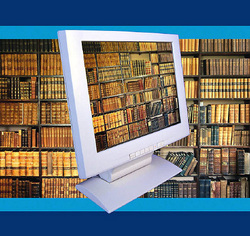Task 4: A Synergy of Books and Bytes

The term "New Media" has been floating through our heads since the day we signed up for Mrs. Güldenring's class. They certainly have a greater impact on school today than it was the case ten or twenty years ago. But is it really that beneficial to change every aspect in an English class with new media so that we can experience the world in the newest fashion? An example of this would be to replace books with monitors/text data on a screen, audio books or e-lectures. This would be a bad example of new media usage. I think that students should still be able to use analogue media like books and be able to navigate in a library in order to find them. This "old" way of finding information is still the most accurate. In today's world of internet research students think that every pile of data they harvest from internet pages like "www.wikipedia.com" is credible and therefore can use it in every work. Of course this is not true because of the fact that everybody can edit these articles, making it possible for people not familiar with the matter to edit untrue or unproven facts. Students should not only rely on the internet in these cases although it can be a good addition to works cited. An example of a source with high credibility would be the "Encyclopaedia Britannica" which is one of the most extensive reference books in the world. But also German encyclopediae like "Brockhaus" are quite interesting for students. They also have the side effect that mediation and translation can be trained while researching in German books. Not only general encyclopediae are affected by this: Students nowadays use online dictionaries like "Leo" to look up vocabulary they do not know. Instead they should use analogue dictionaries to get used to the fact that they are not allowed to use computers during their class exams or their "Abitur". Finally there is the reason of cultural inheritance. Books have been around for hundreds of years. Of course it is handy to copy the contents of thousands of books on a hard drive and take it to where ever a person wants to go and there plug it into the computer to download it. It makes carrying a whole library around much easier but what are people going to do if there is a power outage? They should know how to use books in these cases. Humanity has worked with books for such a long time and in merely three decades we are about to abandon this tradition because of pragmatic reasons.
